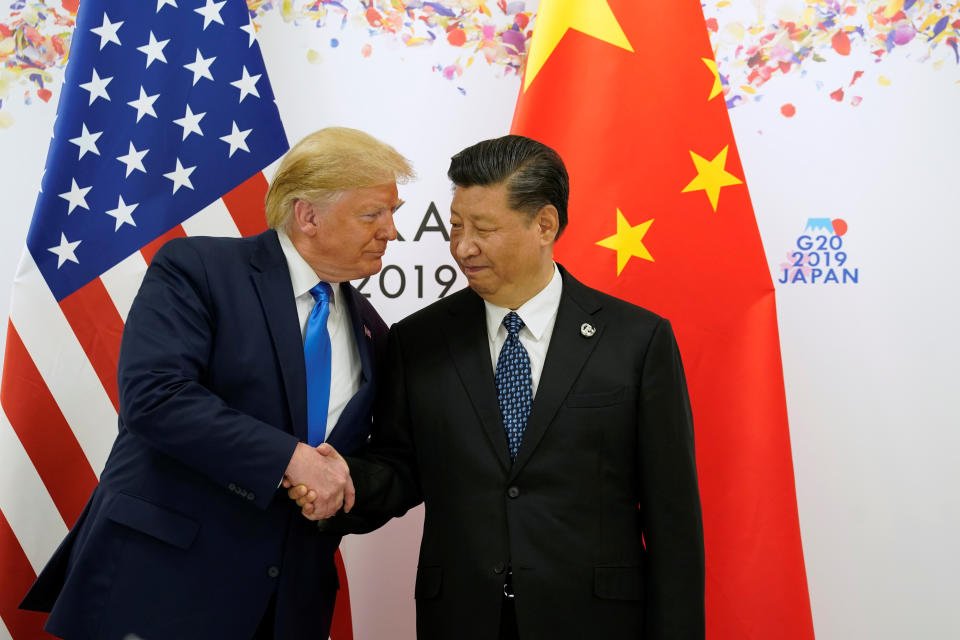Hong Kong protests could have an even bigger impact on markets than US-China trade
As demonstrations in Hong Kong enter their 11th week, a political crisis triggered by opposition to an extradition bill is threatening to become an economic one for Asia’s financial hub.
Since protests escalated on June 9, the Hang Seng’s declines have escalated, with the Hong Kong index shedding more than 2,000 points, while several economists have forecast a recession in the territory in the second half of the year.
Ryan Patel, a senior fellow at the Drucker School of Management at Claremont Graduate University, says the clashes have the potential to pose a bigger risk to global financial markets than the U.S.-China trade war, the longer they drag on.
“Disney (DIS), the hospitality sector, the Marriott (MAR) CEO, they’ve all come out and said this is going to have an effect further down the road,” Patel said, speaking to Yahoo Finance’s “The Ticker.” “Hong Kong is a hub for multinational companies.”
The implications aren’t limited to Hong Kong
Nearly 60% of China’s outbound investment is channeled through the city, according to Bloomberg data. While Hong Kong’s overall economy now contributes just 3% to China’s GDP, a drastic decline from its near 20% contribution at the time of the British handover in 1997, its $5 trillion stock market continues to be an important source of funding for mainland firms, like Tencent and Xiaomi, which are listed on the Hong Kong Exchange.

HKEX changed its listing rules last year to attract big Chinese tech companies and compete with U.S. Exchanges, reclaiming the global IPO crown in 2018. But Patel says that IPO pipeline may start to dry up, as companies assess the risks associated with Hong Kong.
“You put it off, and you let this die down,” he said. “You’re not going to take headlines away from what’s going on. You’re walking into a pretty hard situation, and you’re better off owning the IPO going out next year.”
For decades, Hong Kong has used its proximity to mainland China and its special economic status to attract major European banks and other multinational companies. But that close relationship with China has proven to be a significant headwind for the local economy. Growth has decelerated along with the mainland economy, as it suffers from U.S. pressures stemming from the trade war.
‘Let them work humanely with Hong Kong first!’
U.S. lawmakers have largely stayed mum on the months-long protests, until this week. But on Wednesday, President Donald Trump implied he would be open to meeting with Chinese President Xi Jinping, tying the trade talks directly to the protests.
“China wants to make a deal. Let them work humanely with Hong Kong first!” he tweeted.
Those comments followed a statement by House Speaker Nancy Pelosi Tuesday, calling for the Trump administration to take a stronger stance backing Hong Kong protesters, whose demonstrations were sparked by a proposed law that would allow extraditiont to China but have expanded to allege police misconduct. Pelosi has also criticized the local leadership’s handling of the clashes.
“The pro-Beijing Chief Executive and the Hong Kong police forces must immediately cease aggression and abuse being perpetrated against their own people,” Pelosi said in a statement.

The demonstrations have paralyzed parts of Hong Kong for nearly three months now, with the most recent escalation at the airport, grounding flights to and out of the city for days.
With no signs of either side backing down, Rodger Baker, senior vice president of strategic analysis at Stratfor, told Yahoo Finance that multinational companies are increasingly reconsidering their future in the territory.
“I think the long term question that (companies are) looking at is, as Hong Kong becomes more and more a complete piece of China, is there really any competitive advantage to still being in Hong Kong, particularly when you add all of the other factors like the cost of living, the crowdedness of the space,” Baker said. “You add in this question of Hong Kong losing effectively its special status. Is it still such an exciting and opportune place to be?”
Akiko Fujita is an anchor and reporter for Yahoo Finance. Follow her on Twitter at @AkikoFujita
More from Akiko:
Former U.S. ambassador to China warns Beijing intervention in Hong Kong will provoke Taiwan
'The ultimate insult': How U.S.-listed Chinese companies are gaming American investors'
Really bad business practice': U.S. security experts sound off on Huawei
U.S.-China showdown: Huawei has 'completely taken over' the Mobile World Congress
Read the latest financial and business news from Yahoo Finance
Follow Yahoo Finance on Twitter, Facebook, Instagram, Flipboard, LinkedIn, YouTube, and reddit.
